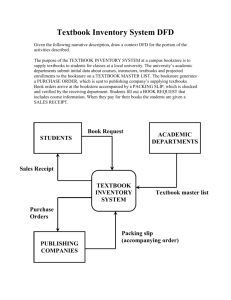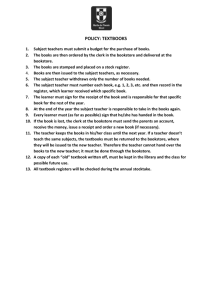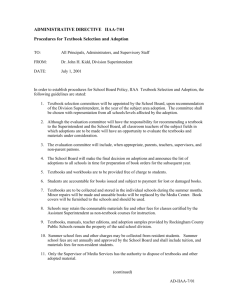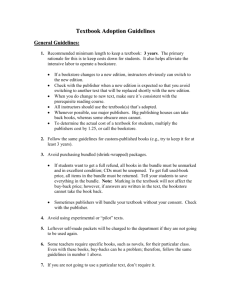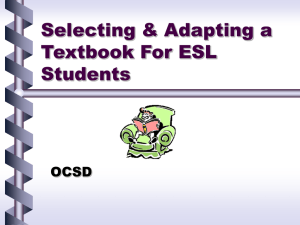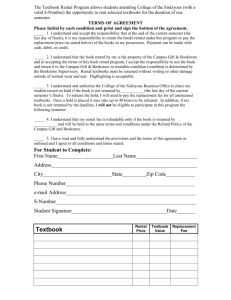Faculty Senate Plenary Meeting Minutes of April 3
advertisement
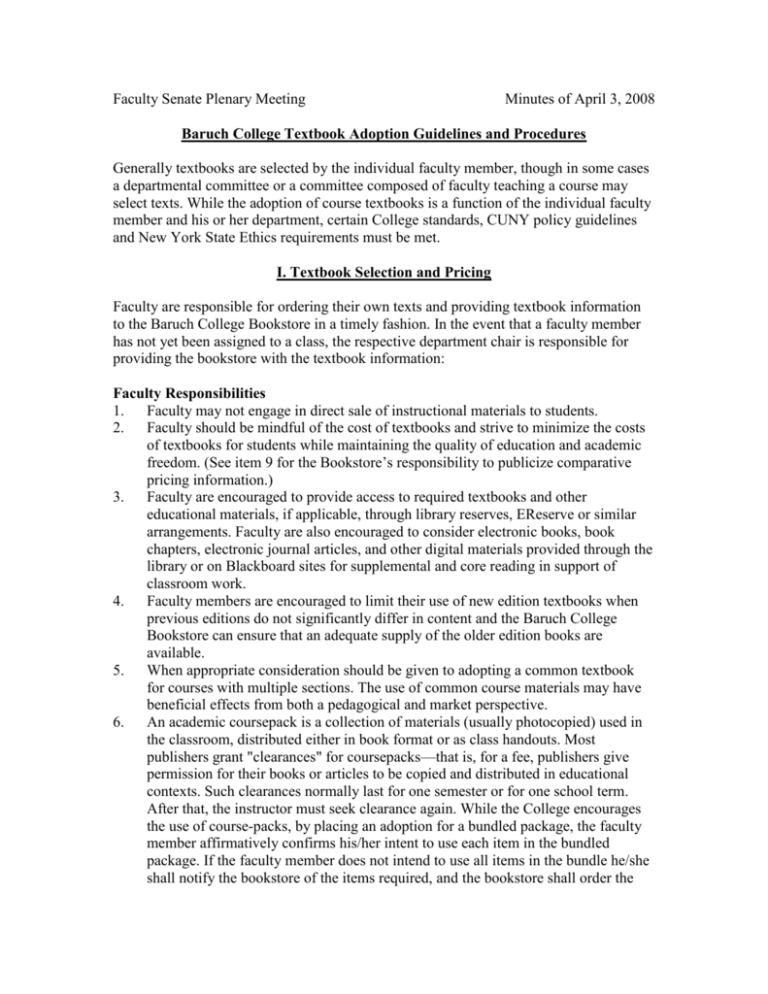
Faculty Senate Plenary Meeting Minutes of April 3, 2008 Baruch College Textbook Adoption Guidelines and Procedures Generally textbooks are selected by the individual faculty member, though in some cases a departmental committee or a committee composed of faculty teaching a course may select texts. While the adoption of course textbooks is a function of the individual faculty member and his or her department, certain College standards, CUNY policy guidelines and New York State Ethics requirements must be met. I. Textbook Selection and Pricing Faculty are responsible for ordering their own texts and providing textbook information to the Baruch College Bookstore in a timely fashion. In the event that a faculty member has not yet been assigned to a class, the respective department chair is responsible for providing the bookstore with the textbook information: Faculty Responsibilities 1. Faculty may not engage in direct sale of instructional materials to students. 2. Faculty should be mindful of the cost of textbooks and strive to minimize the costs of textbooks for students while maintaining the quality of education and academic freedom. (See item 9 for the Bookstore’s responsibility to publicize comparative pricing information.) 3. Faculty are encouraged to provide access to required textbooks and other educational materials, if applicable, through library reserves, EReserve or similar arrangements. Faculty are also encouraged to consider electronic books, book chapters, electronic journal articles, and other digital materials provided through the library or on Blackboard sites for supplemental and core reading in support of classroom work. 4. Faculty members are encouraged to limit their use of new edition textbooks when previous editions do not significantly differ in content and the Baruch College Bookstore can ensure that an adequate supply of the older edition books are available. 5. When appropriate consideration should be given to adopting a common textbook for courses with multiple sections. The use of common course materials may have beneficial effects from both a pedagogical and market perspective. 6. An academic coursepack is a collection of materials (usually photocopied) used in the classroom, distributed either in book format or as class handouts. Most publishers grant "clearances" for coursepacks—that is, for a fee, publishers give permission for their books or articles to be copied and distributed in educational contexts. Such clearances normally last for one semester or for one school term. After that, the instructor must seek clearance again. While the College encourages the use of course-packs, by placing an adoption for a bundled package, the faculty member affirmatively confirms his/her intent to use each item in the bundled package. If the faculty member does not intend to use all items in the bundle he/she shall notify the bookstore of the items required, and the bookstore shall order the 7. individualized items when the store’s procurement is cost effective for both the students and the institution and such items are available from the publisher. The faculty member will indicate whether textbooks are “required” or “recommended.” A textbook should be designated as “required” if, and only if, the faculty member intends to use a substantial portion of the book during the course. Faculty Relations with the Bookstore 8. The Bookstore Manager will notify the faculty member promptly of any information received regarding the delay in shipment of a textbook or of the inability of a publisher to provide the textbook by a required date. The Bookstore Manager will obtain delayed books or substitute books by the most expedient means. When requested, he will attempt to obtain out-of-print books from alternate sources. 9. Increasing the availability of used textbooks, at discounts of 25% or more, significantly reduces the cost of textbooks. National demand for used textbooks far exceeds supply so early acquisition is essential. Having the textbook adoption information early also enables the bookstore to pay students the most for their used books and to acquire more used books. To ensure textbook adoptions are made with sufficient lead time to confirm availability and, where possible, to ensure maximum availability of used textbooks, the faculty, departments or schools shall submit textbook and course material adoption information to the Baruch College Bookstore as early as possible, preferably by the bookstore’s published dates: a. Fall semester adoptions by May 1 b. Winter intersession adoptions by October 1 c. Spring semester adoptions by Nov 1 d. Summer session adoptions by April 1 e. As soon as practical upon the late appointment of the course instructor 10. The Bookstore will provide to faculty and department chairs a list of the costs of their books in the prior term, per course, as well as benchmark averages for the College and colleagues nationally. 11. Though faculty members are responsible for reporting their best realistic estimate of the number of students expected in each course and section, the Bookstore, in fulfilling its contract, must make its own determination on the quantity of each text to stock. Factors used in making this decision include: each faculty member’s estimated quantity needed, sales history (if available), enrollment history (if available), student purchasing patterns, such as use of other book suppliers, and publisher information (e.g., restrictions on returns, minimum quantities required, discounts on volume purchases, response time to orders, etc.). If the Bookstore plans to order less books than indicated by projected course enrollment, they should notify the faculty of the potential shortfall in the supply of course materials available through the Bookstore. 12. The school curriculum committees are encouraged to review and establish reading load guidelines for undergraduate and graduate electives to ensure that course reading assignments are reasonable. In addition these committees should develop recommended guidelines for multi-section courses that would address the student cost of instructional materials. II. Pedagogical and Financial Considerations 13. No employee at Baruch College shall demand or receive any payment, loan, subscription, advance, or deposit of money, services or anything, present or promised, as an inducement for requiring students to purchase a specific textbook required for coursework or instruction. An exception to this rule provide for faculty receiving sample copies, instructor’s copies, or instructional material from publishers for consider as potential textbooks or course material. However, such material may not to be sold. 14. Publishers are not precluded from a business relationship with units of the College (above the individual employee level) provided that relationship meets the standards specified in Baruch College's Policy on Business Agreements with External Entities. This policy states that “Any relationship between the College and an external organization that involves an exchange of money, goods, use of premises, and/or services requires a written agreement properly executed by both sides.” 15. There are no restrictions on the adoption of textbooks written by faculty members. In fact, Baruch College, as does CUNY, encourages faculty members to write and publish. However, to avoid the appearance of a conflict of interest by adopting a textbook they have written the textbook adoption process should be open and transparent. Faculty should request formal approval to use a textbook they authored from a departmental committee, such as the curriculum committee, charged with making an independent and objective reviews of textbooks selected. The author(s) of the textbook should not be part of the selection process. The existence of such a committee is necessary to prevent any conflicts of interest, perceived or real, from occurring. The selection process should be well documented with written critiques of all candidate textbooks. 16. Royalty payments a faculty member earns on textbooks used in a course taught by the faculty member are subject to the rules and policies of the City University of New York. Faculty are encouraged to consider donating royalties earned on books they use in courses to charitable causes as a way of separating pedagogical consider that benefit the students from financial consideration that benefit the individual faculty member. Drafted by the Education Policy Subcommittee of the Faculty Senate, March 27, 2008 Approved by the Faculty Senate, April 3, 2008
